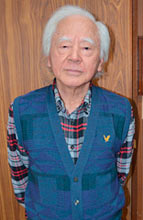90 percent of students in Miyako Island not using local dialect

In Miyakojima City, Tsutomu Sadoyama said, "The dialect promotion needs to start again from the beginning."
January 6, 2014 Ryukyu Shimpo
The Miyako Dialect Promotion Group surveyed elementary and junior high school students in Taira City about the Miyako dialect. More than 90 percent of the respondents answered that they “do not use” or “rarely use” Myaku utsu or the Miyako dialect. The survey revealed the young generation tended not to use the dialect.
The organization carried out the survey last November aimed at 5th grade pupils from 11 elementary schools and second grade students from six junior high schools in the former Hirara City. About 800 students responded to the survey.
To the question of whether they use the dialect regularly, 6 percent of the elementary school pupils and 4 percent of the junior high school students answered that they often use it. About 50 percent of the elementary school pupils and junior high school students answered that they sometimes use it. To the question of how much they understand the dialect, 2 percent of the students answered that they understand it well. Sixty percent of the elementary school pupils and 50 percent of the junior high school students answered that they understand it a little.
Asked to translate Japanese into the dialect, 50 percent of them did this correctly. They said “tandigaa tandi” for “thank you.” One or two percent of them said “aagu” for “song.” Asked to translate the dialect to Japanese, 14 to 15 percent of them said “health” for “ganzu.” Many questions got correct answers in less than ten percent. The organization chair Tsutomu Sadoyama pointed out that the respondents who answered that they often use the dialect or slightly understand it, cannot actually use it. He commented, “This shows the promotion of the dialect needs to start again from the beginning.”
Meanwhile, 55 percent of the elementary school pupils and 43 percent of the junior high school students replied that do not want to lose the dialect.
Sadoyama said, “Although parents should use the dialect at home to make their children familiarize with it, the parents cannot speak it either. We need to encourage conversation in the dialect by presenting specific examples.”
(English translation by T&CT and Megumi Chibana)
Previous Article:Okinawa Governor approves landfill for extending runway of Naha Airport
Next Article:Okinawa Jazz Association lights up Naha with colorful vocals
[Similar Articles]
- OPG publishes book to help elementary and junior high students learn Shimakutuba
- US aircraft noise disrupts classes in majority of public schools around Futenma and Kadena
- Twenty-nine haiku stone tables placed on Izena Island
- Junior high-school student whose parents are from China speaks out against prejudice
- Okinawa survey results show 61% oppose Henoko relocation, 18% support Abe administration
 Webcam(Kokusai Street)
Webcam(Kokusai Street)


